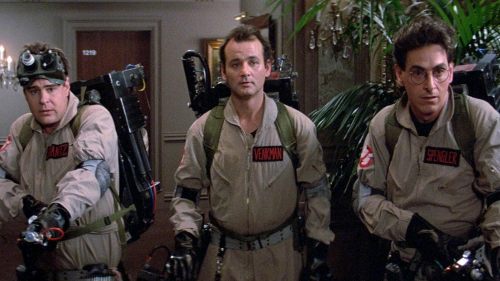Collins’ Crypt: Thanks To THE REFLECTING SKIN, I Won’t Be Watching GOOSEBUMPS
My son is five now, so he's within a year of when I know I started watching horror movies. With that in mind, the other day I asked him if he maybe wanted to watch a "spooky movie" around Halloween this year (I didn't offer any specific suggestions, but in my head I was thinking something like Goosebumps or Paranorman), and he actually agreed - which surprised me since he's not too big of a movie watcher in general (he'll binge Paw Patrol for hours, so it's not an attention span thing) and has repeatedly turned down the likes of Star Wars and even certain animated films (I wanted to see Wonder Park, but he said no and I didn't want to go by myself, so I missed out!). But then I had an inadvertent double feature that made me think maybe I should let him wait another year or two or five until he's confronted with the morbid ideas even the most family-friendly of these films can't help but inspire. These films - a theatrical viewing of Scary Stories To Tell in the Dark, and then The Reflecting Skin courtesy of the new Blu-ray from Film Movement - have little to do with each other, as anyone who has seen them both can attest, but one common thread is that both force their young protagonists (mid-teens in Scary Stories, an eight-year-old in Reflecting Skin) to confront death and all of the awfulness that entails.
(SPOILERS FOR BOTH FILMS FOLLOW!)
It's less overt in André Øvredal's film (based on Alvin Schwartz's books, which were aimed at younger audiences than its lead characters), which is mostly yet another "we unleashed evil and now we have to stop it" kind of thing, but surprisingly does allow a few of its characters to get killed off. The characters in question are in the sort of middle area for horror movie protagonists - not exactly children (i.e. safe for sure) but not old enough to be the surefire goners wandering around Crystal Lake or the backwoods of Texas either, so I was legit surprised when one of them was killed early on and then two others are taken into some sort of "underworld" (i.e. one character is dragged under his bed and disappears, his fingernail scratches leading directly into a wall).
But their vague fates don't really register as traditional "deaths", which is why a later scene of Ramon (Michael Garza) telling Stella (Zoe Margaret Colleti) about his brother is such a gut-punch. Ramon's older sibling wasn't killed by the Jangly Man or the Pale Lady - he was blown to bits in Vietnam, for the same war that Ramon has now been drafted to join. Seeing his brother come home "in pieces" has resulted in Ramon dodging the draft, though thanks to the film's events he ultimately decides to go - it's partially because he realizes he has responsibilities to live up to, but it also comes across as a sort of Final Destination-y "death is inevitable" message. It's a surprisingly grim note to end the film on (I half expected an American Graffiti-esque "they all died, or worse, ended up selling insurance" kind of text epilogue), with the film taking place in 1968, aka the deadliest year of the war with regards to US soldiers - his odds of coming back aren't great! And while Stella holds out hope the other friends are still alive somewhere, some time has gone by, so clearly they've had to accept the possibility that they're never coming back.

However, at least at 16-18 years old the teens have probably had some other brushes with death (a grandparent or the like, not to mention exposure to it in pop culture). Seth, our 8-ish hero of Reflecting Skin (also a period piece, set in the early 1950s) lives in a rural farm town with no discernible access to television or a movie theater, so the word "horror" might not even be in his vocabulary yet. The film starts off as a somewhat standard coming of age drama, with Seth and his friends playing pranks (exploding frogs, which was a thing back then) and doing his best to not get punished by his overbearing mother, but the cracks begin to show before long and you realize this is closer to David Lynch than Norman Rockwell. When he has to apologize to the target of his latest frog prank, a widow named Dolphin Blue, she tells him she is 200 years old, and thanks to the pulp novel his father is reading giving him the idea, he instantly believes her to be a vampire.
This is the first of many supernaturally-charged things he believes that in reality have far more rational explanations he simply isn't prepared to accept or understand yet. When his brother (Viggo Mortensen, still relatively unknown) begins losing hair and weight, Seth believes that he is becoming a vampire as well thanks to his romantic relationship with Ms. Blue, but what's really happening is that he has radiation poisoning from serving in Japan at the time of Hiroshima bombing. Some of his adolescent theories come off as amusing (in a VERY darkly comic way) but by the end of the film his beliefs have gotten someone killed, at which point he lets out a heartbreaking scream as the credits begin to roll, either from realizing that his plan didn't work or that he just inadvertently matured a bit and realized how awful the world can be, depending on your interpretation.
The 1990 indie was marketed as a horror film (by, sigh, the Weinsteins - this was an early Miramax release in the US), and writer/director Philip Ridley has even described it as one (as well as a comedy and a romance), but watching it as a horror film will do it a disservice of sorts - it's best to go in expecting a drama and let the horrific elements (which are brief) come as much of a surprise as they do to poor Seth (when he recognizes them, that is). There are some truly unsettling moments and creepy scenes with minimal explanation (the bird twins!), but ultimately I found myself more and more terrified not by the film's content, but the idea of my own son experiencing these things, in a film or reality, and having the same frustration and confusion when he (or I) can't come up with an explanation for them. My son is a kid who won't believe me when I tell him the dentist isn't trying to hurt him - how can I convince him that Frankenstein's Monster isn't real if he gets it in his head that he is?

I had seen The Reflecting Skin several years ago as a Horror Movie A Day entry and quite enjoyed it in a "Well that was a strange movie and a nice break from all of the killer scarecrow shit I usually see" kind of way, but this was the first time I had watched it as a father, within a few hours of yet another round of "my kid is asking me questions I don't know the answers to". Any parent can sympathize with this; for example, your kid sees a building that catches his eye for whatever reason, asks you who "lives" there, and unless you happen to actually know, your "I don't know" results in the kid saying something absurd like "I think that's where Spider-Man lives." Kids need to make sense of what they see, and their limited understanding of the world around them gives them very few options to come up with to satisfy their curiosity, something I didn't truly comprehend the first time I saw the film. Apart from making me feel kind of dumb every now and then when I don't know things I probably should (why DO batteries die when you're not even using the toy?), these queries are usually benign and trivial, but ultimately he's going to be asking about far grimmer things.
In fact he already has. A couple weeks ago, we were out doing errands when the road we were on was clearly being quickly closed off, and a quick check of Twitter confirmed that there was an active shooter situation. He asked why the road was closed and I told him that a bad guy with a gun was in the area and they wanted us to stay away to be safe. He's only five, so to him guns are still the exclusive property of Stormtroopers (who usually miss) and the like, and he knows (I think?) that those are made up things, anyway - this was the first time he became aware that guns exist in the real world and can really hurt us or worse. His only brush with death thus far has been our cat, who was just sick - at this moment it clicked that someone could be hurt enough to die for real. He went back to his Kindle once we were back on track for wherever we were going, but then he brought it up out of nowhere a week or so later, clearly bothered by the real-life "bad guy" being so relatively close to home.
So yeah, the real world has enough real life horrors - I don't need to rush him into the imagined ones until he's better at processing these things, especially when it certainly won't be the last time he has a brush with such dangers (he starts school next week; he'll probably have to do a shooter drill). The Scary Stories kids, pointedly, begin the movie by dressing up and walking around on Halloween even though they've gotten too old for trick 'r treating - struggling to hold on to those last bits of adolescence as adulthood keeps forcing itself on them thanks to the war, absent parents leaving them to fend for themselves, etc. And poor Seth got his childhood robbed just as it was really getting started (on the commentary track, Ridley mentions that even though it's not reflected in the film itself, what we are seeing is an older Seth telling the story from his very fractured mind), being confronted with everything from abortion to nuclear bombs before he probably even lost all of his baby teeth. Seeing these films practically back to back reminded me that the worry-free part of life is all too brief and that I should perhaps delay showing my son those "gateway" horror films a bit unless he requests them himself. Paw Patrol probably has a Halloween-themed episode, right?



